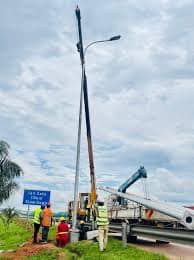By Denis Jjuuko
In the early years of the National Resistance Movement (NRM), Dr Samson Kisekka was appointed Prime Minister and then Vice President. Kisekka was said to be a rich man who even had a certain part of Kampala named after him. He had built a modern private hospital in the 1970s in Makerere Kivulu/Kagugube area near Old Kampala. When traders of motor vehicles set up shop nearby, the market became known as Ewa Kisekka or Kisekka Market as we know it today.
Dr Kisekka is said to have been a man of means who is rumored to have provided significant resources to Museveni’s rebel outfit, the National Resistance Army or NRA which would capture power in 1986. Kisekka was rewarded with the influential position of Prime Minister and later Vice President.
Vice Presidents all over the world usually play the role similar to that of a bridesmaid — be near the bride but not do too much to outshine the bride. May be because of boredom, Dr Kisekka perhaps became the first Vice President in history to hold a weekly radio show. In the days before 1993, Uganda had only one radio station. So, every Tuesday evening, Kisekka did his radio show on Radio Uganda.
He was boisterous, boastful, funny and engaging with a deep voice that was actually meant for radio despite his old age. He boasted about his farm in Temangalo near Kampala. He talked about the good life he lived. He reminded whoever cared to listen that he was “Omusawo Omutendeke” translated as a professional medical doctor.
As a “Doctor Omutendeke”, he urged his audience to listen to the advice he was giving them if they wanted to live a similar good life like the one he was living. One of Kisekka’s pet subjects was on how Ugandans prepare for visitors. How they leave no stone unturned because visitors were expected at their homes or in their communities.
On a tour somewhere in Uganda, Kisekka realized that the community had just worked on the road so that he could use it. They had filled the potholes, dug the trenches and had the road reserve slashed of any bushes days before his arrival. In his speech, which was played on Radio Uganda, Dr Kisekka deeply laughed at the community telling them in their faces that they were an unserious lot.
He said they didn’t need to dig up the road for him because he was arriving in a monster vehicle as VP and most importantly, he was also wearing designer shoes. There was no way thorns would pierce his feet. He reminded them, that his car had been driven all the way to the platform where he was standing to give the speech.
He then delivered the punch. “Unlike me, you and your children have no shoes. You have no vehicles so thorns will always be piercing you. What about ensuring that your community road is always well maintained even when you are not expecting me?” he said and then let out his signature laugh.
On another time, he refused the gifts of goats and chickens the community was giving him. He told them his farm in Temangalo had lots of goats, cows and whatever food he wanted to eat. Yet when he looked at the people giving him the chickens and eggs, they looked like they lacked proteins and hadn’t eaten eggs or meat in a year. He laughed again, boisterously with a lot of pride.
Kisekka must be turning in his grave that decades after his speeches and even death, his NRM-beloved is doing exactly what he was telling people not to do — preparing everything for visitors as they starve. Patching up potholes and lighting up expressway spurs just because visitors are coming. The visitors would tell a mature palm tree that was planted the other day. They would tell a road patched up for them. They would know that the lack of traffic jams is because roads are blocked and the citizens are told to use the dusty Nakawuka road to access Entebbe International Airport.
Imagine if we had built the Nakawuka road without waiting for the visitors? Businesses would prosper in that area. Uganda Revenue Authority would collect more taxes. We would decongest Kampala of traffic jams. If we hadn’t waited for visitors to patch up potholes, we would have created a culture where roads are well maintained throughout the year.
The visitors would then come and see a well-managed country and would wish to return or invest. We may create the impression for visitors from Entebbe to Munyonyo and some parts of the city centre but what if they venture out of their hotels and visit bars in Najjeera on their own? Won’t they see the messed up roads? What if they visit Kabalagala (which many will do) and then realize that not everything that glitters is gold? Will they still be impressed?
As Kampala and Entebbe were put on a standstill so that Uganda hosts delegates attending the Non-Aligned Movement (NAM) and the G77 conferences, let us a create a culture that impresses the citizens and residents first. That is how countries and cities develop. Remember what Kisekka said more than 30 years ago.
The writer is a communication and visibility consultant. djjuuko@gmail.com










